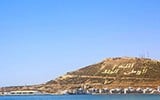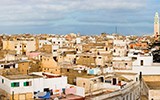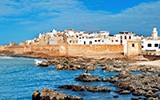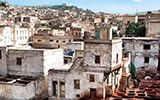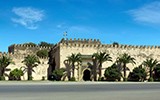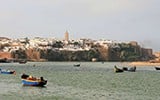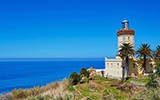In a dynamic and diverse city like Casablanca, there's practically no chance that you will ever get bored. With a wide range ...
Living in Morocco guide for expats
All the information you need to relocate and live in Morocco.
Our selection of articles for expatriation in Morocco
Casablanca is a big city, with different resources for different tastes, just like the city itself. Whether you have relocated ...
Sport in Morocco is mainly practiced in gyms and sports clubs, and Casablanca is no exception. It is now common to see more ...
Moroccans are generally proud of themselves and their civilization, thus raising Moroccan gastronomy to a sacred level ...
Moving around in Casablanca is a day-to-day challenge. However, the city has a fairly developed transportation network with ...
In Casablanca, as anywhere else, everyone chooses the area where they want to live according to their own criteria: the budget ...
The real estate market in Morocco and particularly in Casablanca, is quite similar to the European market. Therefore ...
Stretching over 220 km², Casablanca is more than twice the size of Paris. Like all historical cities and smaller towns in ...
Moving to Casablanca for work might not be an easy step as opportunities are mostly available for entrepreneurs. However, this ...
Working in Morocco can be confusing for anyone coming from European countries. As an economic capital, Casablanca is at the ...
Working in Casablanca and Morocco, in general, can prove to be a culture shock for Europeans or Westerners. The expectations ...
Being the economic capital of Morocco, Casablanca offers a wide range of possibilities to study after high school. Without being ...
Around the world, student life is often associated with busy academic life, work, but also leisure and celebrations. There is no ...
Casablanca. The name alone is mythical and a symbol of romanticism, thanks to Hollywood! But what is the truth behind it? If ...
Casablanca is, above all, a mythical city with a diverse culture. With many visitors and expats traveling there all year round ...
About Morocco
Geography and landscape of Morocco
The bulk of Morocco's geography consists of mountains with slopes, dominating the northern central part of the country (notably the Atlas mountains), also the source of most rivers in the country, notably the Moulouya River, flowing from the Atlas to the Mediterranean sea, and desert and plains dominating the southern. The metropolitan areas are mostly closer to the coasts, both in the west and the north, which is also dominated by the Rif mountains. The highest point in Morocco is the peak of Jebel Toubkal at an altitude of 4,165 m (13,664 ft), which is part of the Atlas Mountains. In contrast, the lowest point is Sebkhat Tah, flat sand situated near the city of Tarfaya in the south of the country (Sahara desert), at 55 meters (180 ft) below sea level.
Demography of Morocco
Morocco has a population of over 35 million inhabitants, including a large number of expatriates. The official languages are Arabic and Berber. Most Moroccans speak a dialect of Arabic that is quite different from Standard Arabic. Arabic is the administrative language, and French is the language of business and university studies, as well as English. Spanish is also spoken in some cities (mostly in the north of the country).
Economy of Morocco
Morocco has been developing very quickly over the past few years. The country ranks in the sixth position among the most powerful economies of the African continent, with a GDP of more than $100 billion. The country's economy is mainly based on the export of phosphates, as well as the agricultural sector. As of recently, the service sector (outsourcing of telecommunication) recorded the highest growth, accounting for just over half of the country's GDP
Policy of Morocco
Morocco has a constitutional monarchy regime. The king of the country is King Mohammed VI, and Saadeddine Othmani has been elected Prime Minister. Morocco is a member of the African Union, the United Nations, the Arab League, the Arab Maghreb Union, and the International Organisation of the Francophonie.
Climate of Morocco
Morocco's climate varies greatly by region. You can find a hot, dry climate in the Sahara and southern regions, where summers are very hot and winters are only slightly cooler. At the other extreme, temperatures in the Atlas Mountains go below freezing in the winter, and some areas even get snow during the winter months. The coastal areas are warm and humid in the summer and get cooler and rainy in the winter. Make sure to bring lots of layers when visiting Morocco, as it is possible to visit the dry, hot desert and cold, snowy mountain areas all in one day!
Immigration in Morocco
Since the beginning of the 21st century, Morocco has welcomed a large number of migrants mostly from Subsaharan countries trying to reach Europe and from middle eastern ones impacted by the conflict in Syria and Iraq. However, over the last few years, Morocco has become a default destination for Subsaharan people who chose to stay in the country by their own volition. There is a large Subsaharan community, mostly Senegalese, Congolese, and Ivorian, in many metropolitan cities like Casablanca, Rabat and Tangier.
Morocco is also a growing destination for many American and European expatriates. There are large American, French and Belgian communities in Casablanca, Rabat, Agadir, Essaouira and some Spanish communities in northern cities like Tangier.
Culture in Morocco
Morocco is known for its rich and diverse cultural landscape which is mainly due to its geographical location and history. It has been a host for many people through history including Arabs, Phoenicians, Romans and others. Each region in Morocco has its own cultural norms, cuisine, attire, traditional musical styles, and in some cases, even the dialect differs.
Since its independence in 1956, Morocco has developed a large art scene in painting, filmmaking, music, sculpture and theatre. There are film festivals year-round in all major and small cities, and theatre productions in all major cities. Morocco is also host to many big music festivals like Essaouira Gnawa Music Festival and Mawazine Festival and Visa For Music in Rabat as well as traditional music festivals like the Fes Sacred Music Festival.
Social life in Morocco
Morocco is quite a peaceful country. You'll find that most Moroccans live in large family households and are quite welcoming. Religion is an important part of life in Morocco as well as the country's identity, and despite being open to international cultures and markets, it's still a conservative country. You'll find that most middle-aged women wear headscarf outdoors and traditional clothing, and in some neighbourhoods, wearing anything above the knee for females could attract some unwanted attention. On the other hand, most major cities have a vibrant nightlife, cool bars and pubs, and many places where you can go out, have fun and meet new people.
Latest housing offers in Morocco
Latest job offers in Morocco

